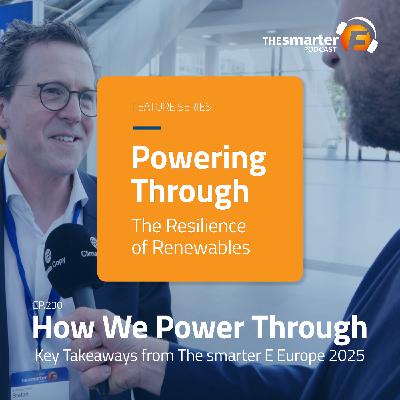#TSEP 236 Double Harvest: How AgriPV Combines India's Energy Transition and Agriculture
Description
In this episode, we take a look at a topic that combines agriculture and the energy transition: agri-photovoltaics in India. India is considered one of the largest agricultural markets in the world and at the same time a hotspot for solar energy. But how can these two worlds be successfully combined in practice? Which technologies are gaining ground? And which political conditions are accelerating or slowing down the market ramp-up? We discussed this with Tobias Winter, who heads the Indo-German Energy Forum Support Office in India.
About Tobias Winter
Mr. Tobias Winter was born in East Berlin, Germany and holds a degree in Business Administration of the Rhine-Westphalia Institute of Technology Aachen (RWTH Aachen University). During his career, Mr. Winter has gained professional experience in renewable energy and energy efficiency projects and the corresponding legislation in Germany, India, Argentina, Uruguay and Paraguay. He first came to India in 2005 to develop a solar water desalination project with TERI Bangalore. He then worked in Argentina implementing solar energy solutions in the highland region Puna. From 2009 to 2014, he was the Director of the Competence Center in Renewable Energies for the German Chambers Network in Argentina, Paraguay and Uruguay. In 2015, he came back to India, since then leading the Support Office of the Indo-German Energy Forum, to promote cooperation in energy security, energy efficiency, renewable energies, investments in energy projects and collaborative research and development with participation from India and Germany. The Indo-German Energy Forum Support Office has been tasked by Prime Minister Modi and Chancellor Scholz to implement the Indo-German Green Hydrogen Task Force.
The Indo-German Energy Forum is part of the Bilateral Energy Partnerships – the central instrument of the energy policy of the Federal Ministry for Economic Affairs and Energy. With now more than 30 partner countries, they form a global, steadily growing and valuable network between Germany and strategic partner countries that want to transform their energy systems for a sustainable, economically attractive and secure energy transition. The declared aim of the Bilateral Energy Partnerships is to shape a successful global energy transition that combines security of supply, decarbonization of industry and foreign trade promotion with effective climate protection.
























